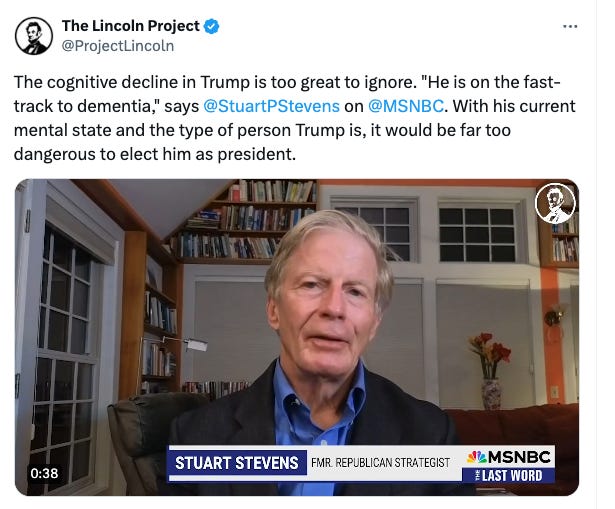Scrolling through X the other day, I came across this snippet of an interview with former Republican consultant Stuart Stevens, who has become one of the leading and loudest voices in the “Never Trump” movement:
I replied to that tweet with this:
This is absolutely ridiculous. You can HATE Trump. You can believe him unfit for office. (I definitely think the latter.) But diagnosing him from afar? With something as serious as dementia? It's just deeply irresponsible.
And, um, people had THOUGHTS. More than 1,000 people offered comments and the tweet has, to date, more than 1.1 million impressions (whatever that means).
This post is free. I hope you share it far and wide. I also hope you consider investing in the journalism project I am building here. It only takes $6 a month — or $60 for the year — to become a paid subscriber!
The VAST majority of the people who commented on my tweet said, basically, the same thing: You have no idea what you are talking about. He clearly is in cognitive decline. Lots of psychologists and psychiatrists are saying it. You are an idiot!
Here’s one representative example:
That Twitter handle is affiliated with a group called “Duty to Warn.” The group was founded by a guy named John Gartner, a psychotherapist and one-time professor at Johns Hopkins Medical School, with a simple goal: To make clear that in his (and his colleagues) professional opinions, Trump is in serious cognitive decline.
Gartner was the driving force behind a 2017 online petition, which now has more than 70,000 signatures, that states the following:
We, the undersigned mental health professionals (please state your degree), believe in our professional judgment that Donald Trump manifests a serious mental illness that renders him psychologically incapable of competently discharging the duties of President of the United States. And we respectfully request he be removed from office, according to article 4 of the 25th amendment to the Constitution, which states that the president will be replaced if he is “unable to discharge the powers and duties of his office.”
The movement has grown, substantially, since Gartner started it 7 years ago. The group made a documentary — “Unfit” — in 2020 detailing its case that Trump is mentally declining. It has another doc — “Untruth” — in the works. The “Duty to Warn” X handle has 439,000 followers.
Gartner gave an interview to Jay Kuo and “The Big Picture” Substack last month where he explained his views in depth. The whole interview is very much worth reading but I wanted to pull out a small excerpt that I think summarizes nicely where Gartner is coming from:
The evidence for Trump’s dementia is this: Trump shows an overall decline from his own cognitive baseline, with marked progressive deterioration in 4 areas: memory, ability to use language, behavior, and gross and fine motor skills.
In the interview, Gartner goes into far more detail on each of those four areas — providing examples of why he believes what he believes.
And he also pushes back on the notion that diagnosing Trump with dementia from afar is somehow not advisable. Here’s his take on that:
I don’t know if people know this, but in real life, in day-to-day clinical practice, we diagnose dementia based on behavioral observation and informant reports every day of the week. Thousands of medical charts would back me up on that. An “interview” with a demented person doesn’t usually yield a lot of information, for obvious reasons.
As a professional community, thousands of us have observed hundreds of hours of Trump’s public behavior. We also have dozens of informant reports. So all the people hyperventilating about “diagnosing from a distance” should take a breath. This is more business as usual than you might think. In real life, we’ve institutionalized tens of thousands of patients on far less data.
That surprised me. So, I went looking for medical backup for Gartner’s claim that dementia can be credibly diagnosed by watching someone on TV.
Here’s how the National Institute of Aging (at the National Institute of Health) says dementia (a broad umbrella term that encompasses a number of cognitive issues including Alzheimer’s Disease) can and should be diagnosed:
Cognitive and neurological tests
Brain scans
Psychiatric evaluation
Genetic tests
Cerebrospinal fluid (CSF) tests
Blood tests
You will note that “watching someone speak on TV” is not included in that group.
Looking for more, I turned to the Mayo Clinic. Here are their guidelines on how to properly diagnose dementia:
Cognitive and neuropsychological tests
Neurological evaluation
Brain scans
CT or MRI
PET scans
Laboratory tests
Psychiatric evaluation
Again, you will notice that observing someone from afar is not on the approved list of how to diagnose someone for dementia.
And then I found this — from the Alzheimer’s Society:
A diagnosis of dementia can only be made after a thorough assessment by a specialist health professional. This involves the specialist taking a thorough medical history, carrying out detailed tests, and most often arranging a brain scan. It’s not possible to reliably diagnose a person just by watching them on TV.
That same article from the Alzheimer’s Society mentioned the “Goldwater rule,” which I hadn’t heard of before.
Back in the 1964 campaign, a magazine called Fact published a story with this headline: “1,189 Psychiatrists Say Goldwater Is Psychologically Unfit to Be President.”
Most of the people who said Arizona Sen. Barry Goldwater, the Republican nominee against President Lyndon Johnson, was unfit didn’t attach their name to their analysis, which included lines like this one: “I believe Goldwater has the same pathological make-up as Hitler, Castro, Stalin and other known schizophrenic leaders.”
Goldwater sued the magazine — and won.
In the wake of that article, the American Psychological Association issued a statement of ethics that became known, colloquially, as the “Goldwater” rule. And it goes like this: “[I]t is unethical for a psychiatrist to offer a professional opinion unless he or she has conducted an examination and has been granted proper authorization for such a statement.”
So, there’s that.
And then there’s this, which was written in 2017 by Allen Frances, who served as the chair of the Department of Psychiatry and Behavioral Sciences at Duke University, in direct response to his colleagues who were diagnosing Trump from afar:
Before I go any further, you should know that I am a lifelong political inactivist, shamefully missing in action from the tumultuous political events of the last 50 years. It took the travesty of a Trump presidency to get me fully engaged.
Confusing Trump’s behavior with mental illness unfairly stigmatizes those who are truly mentally ill, underestimates his considerable cunning, and misdirects our efforts at future harm reduction. And the three most frequent armchair diagnoses made for Trump — narcissistic personality disorder, delusional disorder, and dementia — are all badly misinformed.
On dementia in particular, Frances wrote:
The dementia diagnosis is based on the supposed poverty and perseveration in Trump’s current speech patterns compared to his earlier ones. I would attribute this to the number of stump speeches Trump has given. Abraham Lincoln could find creative ways of repeatedly saying the same thing, but Trump has never achieved Lincoln’s eloquence. He uses the same words over and over again because they successfully work up the crowd.
Convincing proof that Trump is not demented is his undiminished creative and canny skills at blaming, bare-knuckle political fighting, and self serving.
The simple fact is this: Diagnosing someone with dementia from afar is wrong. It’s unethical. There is NO accredited organization that suggests it can or should be done.
Look. I get it. People HATE Trump. They fear that if he is elected again, he will tilt us into authoritarianism. They may even really and truly believe that there is something wrong with him mentally. And, they note, Republicans (and Trump) have been saying Joe Biden has dementia — and worse — for years now.
So, first off, two wrongs don’t make a right. It’s absolutely wrong for Donald Trump to claim that Joe Biden has some sort of undiagnosed cognitive issue. But using that to justify why it’s ok to say the same about Trump is a pretty slippery slope. “Well they did it first” is a logic stream that ends nowhere good for us as a society.
Second, it is hurtful to people who are struggling with dementia — and their families. Again, I turn to the Alzheimer’s Society, who said it better than I ever could:
When an older politician is accused of having dementia, it’s usually done to either smear their character, question their policies, or seek to disqualify them from holding office. It’s rarely said out of genuine concern for their health or wellbeing. The tone tends to be negative, demeaning and even hateful – particularly on social media platforms.
This reinforces outdated stereotypes of dementia being a condition that, of itself, disqualifies a person from participating in their community or having a voice that’s worth listening to.To say that a candidate’s errors or strange behaviors are a sign of dementia is both hurtful and unhelpful to people with dementia and their families, who live with the condition every day and often struggle to have their voices heard.
We want a society in which people living with dementia feel understood, valued, and able to play an active role in their community. This is not helped when people use unfounded allegations of dementia or mental health conditions to belittle or humiliate politicians they don’t like or agree with.
Third, there are LOTS of other things that Trump has done — both in office and in the 2024 campaign — that you don’t even need to speculate about. They are facts. He lied more than 30,0000 times in four years. He tried to overturn a free and fair election. He repeatedly undermined the effort to combat a worldwide pandemic. He politicized the Justice Department. He was impeached twice. And on and on.
You don’t need to armchair diagnose Trump with dementia for all of those things to still be true. So, please stop. It’s hurtful to people struggling with dementia. It’s deeply unethical and irresponsible. And, politically speaking, it’s missing the forest for the trees.







Chris please tell the MAGA crowd Trump's cult members to STOP saying that Biden has Dementia with the same vigor you are using to ask people to stop saying that Trump has Dementia
I get your analysis, which is only a doctor trained to diagnose dementia can “technically” make the call on a patient’s cognitive state.
Stipulated.
I will only add one example, where the press and electorate-at-large, all concluded that by 1985-6, something was going on with Ronald Reagan.
Yes, he had survived a shooting.
Yes he was in his seventies.
Yes he had survived a skin and colon cancer scare. Yes he was hard of hearing.
Yes, Nancy would answer for him sometimes even though he was standing right there, because he was awkwardly slow to utter even one cogent word.
Again, stipulated.
Turns out, we, the great uncertified unwashed were right: he had early onset Alzheimer’s.
Let’s meet in the middle here, okay?
Trump is different. Maybe he’s angry different, maybe he’s anxiety different, maybe he’s frustrated different, maybe he’s under-over medicated different.
Who knows?
But our eyes and ears aren’t lying.
He is some kind of decline.